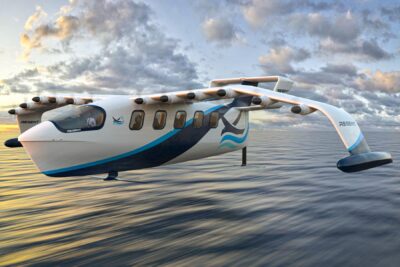Hamburg Airport announces another hydrogen project
Hamburg Airport has announced the next step in becoming a hydrogen hub in general aviation. As part of the ‘Baltic Sea Region Project’, rural Baltic Sea regions are to be better connected to existing aviation hubs with hydrogen-powered small aircraft.
The approximately three-year project, initiated by Hamburg Airport and funded by the EU, is expected to start in November 2023, according to a statement. In addition to Hamburg Airport, 16 other project partners and 24 associated organisations are involved. The project budget is up to 4.8 million euros, of which approximately 1.1 million euros will be allocated to Hamburg Airport. The project partners expect EU funding of around 80 per cent.
Important contents of the ‘Baltic Sea Region Project’ are the development of the supply chain for green, gaseous hydrogen from production to the fuelling of aircraft or airport ground equipment as well as test operations. Almost all major airport operators around the Baltic Sea are part of the partnership, including Finavia, Swedavia, Lithuanian Airports, Riga Airport, and Tallinn Airport.
Only in June, it was announced that Hamburg and Rotterdam Hague Airports are cooperating to explore the feasibility of a flight route between their locations for hydrogen aircraft – a first flight with hydrogen should be possible in 2026. For its part, Hamburg Airport stressed that it is open to technology – that is, supporting aircraft powered by fuel cells or combustion hydrogen engines. “Current designs, however, rather envisage the solution with a fuel cell,” the airport said.
“These are exciting days for the future of aviation. We recently announced our cooperation with Rotterdam The Hague Airport on a flight connection for hydrogen-based aircraft, and now we are getting the green light for the Baltic Sea Region Project,” says Michael Eggenschwiler, CEO. “It is no coincidence that Hamburg Airport is one of the drivers of innovation: as an airport, we have set ourselves the goal of reducing our CO2 emissions to zero by 2035 and completely foregoing compensation. So it is only logical that we also make a concrete commitment to an environmentally compatible future for aviation. As a hydrogen hub, we can contribute to this development very well.”
Jan Eike Hardegen, Head of Environment at Hamburg Airport, adds: “Hydrogen offers great potential for climate-neutral flights on short-haul routes. General aviation with smaller, future hydrogen-powered aircraft is particularly suitable here. Gaseous hydrogen is the propulsion of the future, especially for smaller general aviation aircraft, such as turboprops with 20-30 seats.”





0 Comments